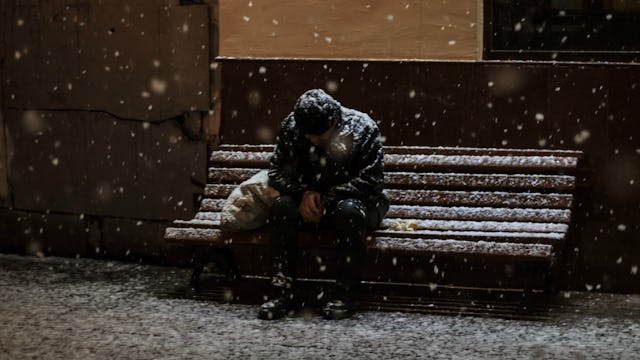My Father Was Arrested For Living In An Airport Terminal

I remember how excited I was as a little girl when I got to ride in a taxi with my grandparents instead of taking the subway. It always felt rewarding with a dash of thrill as if it were a holiday or special occasion.
I didn’t know then that my parents couldn’t afford to take a taxi. I just assumed it was something wealthy people did and my grandparents had been blessed with wealth.
As I grew into my teen years, I would spend the summers in Brooklyn with my grandparents. That’s when I began to put the pieces together. They had things we didn’t have at home such as a TV, food, and more than one bedroom. What was normal for them was a dream come true for me.
By my seventeenth birthday I had the pattern of my parent’s irresponsible failure down to a science. It came in waves and the waves would crash and thrash harder each storm. There was never any money and once I started working, they felt entitled to my measly $6 an hour part time paycheck.
I knew if I continued to live with them I would never have a future. I lived by this imaginary impression the cycle of poverty could be broken. My siblings and I packed our backpacks and set off never to return again. We were all under the age of eighteen.
The last time I saw my father he’d been arrested for stealing a car. I went to visit him in jail. He asked my siblings and I to bail him out. We did. He skipped out on his bail. He ran. We lost our $1,400.
My father had his own form of logic. If he didn’t pay the rent and we were evicted he’d claim if the landlord can afford to send his kid to college then he didn’t need the money. If we ate that morning then why did we need to eat that night? We’d be fine. He’d never keep a job because all of his bosses were assholes. I can’t even count how many asshole bosses existed during my childhood.
When we asked him why he stole the car he told us the people he took it from had more cars than they needed. It was never about the stupid, humiliating, and selfish things he did. His actions were merely a reaction to other people.
More than a decade had gone by since the car theft when I received a call from the Miami- Dade Police Department. My father was homeless and living in the Miami International Airport terminal where he was arrested by the Transportation Security Administration (TSA).
They informed me he claimed there was no one else for him to call and requested I come pick him up. It wasn’t worth it to me to travel from Arizona to Florida to bail him out. Instead, I requested he call me.
When he called I was nervous. I didn’t want to speak to him, but I was curious how he got to this place in life. I had so many questions. What was he thinking? This is who he turned out to be? How did he end up homeless? Why the airport? Why did he ask them to call me? Why did he not get the help he so desperately needed? How could he not see he needed help?
I cringed at the sound of his voice. The more he spoke the more my stomach churned. I said little in response. There wasn’t much for me to say.
He was living in his minivan for a few years. It eventually died and he abandoned it. It had been towed and he had lost what little possessions he had left to his name.
The airport was a master suite to him. He was able to shower in sinks, sleep on couches, ate unwanted food out of garbage cans. It was a resolution to his homelessness situation. It was months before TSA caught on. He referred to it as if he were living in a resort. A part of me was filled with anger and humiliation. The other part of me felt compassion and devastation. He experienced mental illness and he most likely lived up to his level of function.
He asked if I would allow him to come live with me. I thought back to the memories I had growing up. I now had my own children and I needed to protect them. I had once wished someone would have protected me. I was already raising my children. I didn’t want the burden of raising my father.
My belief in breaking the cycle of poverty when I was a teenager became a reality in adulthood. It’s a reality I’ve held onto so tightly.
When I hung up the phone that day it was the last time I spoke with him. I have no knowledge of whether he’s alive or if he’s passed away. I have no closure of what may have happened to him. Was I right to choose myself over his needs?
I used to carry his stories around as if he were baggage. A burden of horrid memories I could never free myself from. I realize now that I should be grateful, because of him I’ve worked hard not to be who he was.